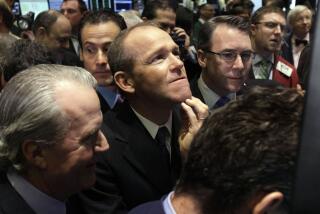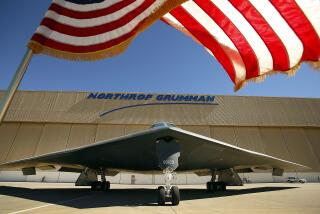Tom Jones, aerospace executive who led Northrop Grumman, dies at 93
Thomas V. Jones, a legendary risk-taker whose gambles paid off when Northrop Grumman rose to the top ranks of the defense industry during the Cold War, has died. He was 93.
Jones died Tuesday of pulmonary fibrosis, his family announced.
Jones had aristocratic tastes that were unusual for an aerospace engineer and later became a respected maker of fine wines from his vineyard in Bel-Air, but he will always be best known as one of the last great titans of the U.S. arms business.
He hobnobbed with European royalty, befriended the Shah of Iran and was close to Air Force chiefs from West Germany to Argentina. He so loved cigars that humidors were standard equipment in the executive conference rooms at the company’s former headquarters in Century City.
Jones was at Northrop’s helm for 30 years and came to personify the maverick aerospace company and the airplanes it produced, transforming the company from a minor player into one of the world’s leading prime contractors and one of its most important technological giants.
He somehow survived an astonishing succession of personal controversies that accompanied his long tenure, including a felony conviction for illegal campaign contributions to President Nixon, a securities consent decree that stemmed from allegations that he paid foreign bribes to sell jet fighters, and even a censure from his own board of directors for concocting an unusual hotel investment in South Korea that backfired into a political scandal.
When he stepped down in 1990, the company was under a federal indictment for falsifying testing of a nuclear armed cruise missile’s guidance system.
“Tom Jones brings to mind the statement from Adm. Arleigh Burke, who said, ‘Give me a strong ship, for I intend to sail into harm’s way.’ Well, that was Tom,” recalled Donald Hicks, a former Northrop executive and senior Pentagon official who remained close friends with Jones to the end.
Jones came from an era when the chiefs of U.S. aerospace companies laid huge bets on future projects, and Jones made some of the biggest of any company, winning big and losing big in the process. Early in his career, he championed the T-38 trainer jet and transformed it into a low-cost fighter that the U.S. exported to its allies. It became the Volkswagen Beetle of jet fighters, used by countries far and wide, from Norway to Turkey and from Chile to Sudan. Early jets cost only $750,000 and their simplicity made them the weapon of choice for nations that wanted an air force but could not afford front-line weapons.
And Jones laid early heavy bets on stealth technology at a time when Northrop was hardly considered a technical giant, but the work paid off when Northrop upended the aerospace industry by winning the secret contract to develop the B-2 Stealth bomber, which remains the most capable such attack plane in the world.
But he also was responsible for some shortsighted mistakes, spending $2 billion to develop the F-20 jet and failing to get a single foreign or domestic order. The U.S. blocked the sale of the jet to Taiwan as relations between the U.S. and China thawed in the 1980s.
Jones’ wife, Ruth, died last year. He is survived by his son, Peter Thomas Jones, a documentary filmmaker in Los Angeles, a daughter, Ruth Marilyn Jones, and two grandchildren.
A complete obituary will follow at latimes.com/obits.
ALSO:
Run Run Shaw, 106, built Asian film empire
Saul Zaentz, 92, Oscar-winning film and music producer
Andy Granatelli, 90, race-car driver and entrepreneur
ralph.vartabedian@latimes.com
More to Read
Start your day right
Sign up for Essential California for the L.A. Times biggest news, features and recommendations in your inbox six days a week.
You may occasionally receive promotional content from the Los Angeles Times.







